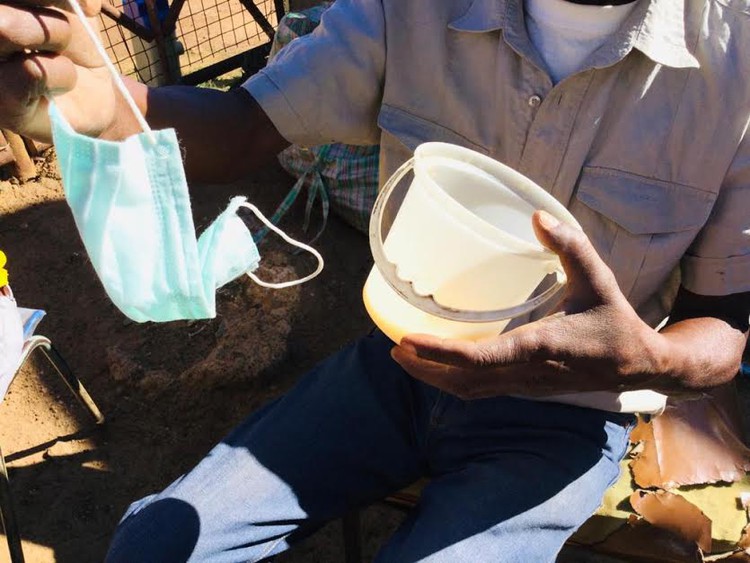
A customer takes off his mask to drink some pineapple beer. Photo: Kimberly Mutandiro
8 May 2020
The road to Lungile’s* shack in the informal settlement of Tsakane in Ekurhuleni, Gauteng, is bumpy and flooded with mud from recent rains. Away from police scrutiny, she is doing a roaring trade in pineapple beer (mbamba) during the lockdown.
When GroundUp visited the shack in the late afternoon, there were four regular customers in one room. In another room, 15 or so 20-litre containers she uses to store her beer were all empty. She had one half-full container left. Customers come to buy as early as 5am, she says.
The lockdown and ban on alcohol sales has sent pineapple sales soaring as the demand for pineapple beer rises.
“l sell at a wholesale price of R43 per five-litre container to those who want to resell, and ten rand per one litre to my usual customers,” says Lungile.
When she heard that authorised beer outlets would be closed and the sale of liquor prohibited, she saw a way to maximize the profits she made from sales of beer. She stocked up on oatmeal and yeast to ferment the beer. She buys the other two ingredients – bread and pineapples – daily.
“Before lockdown l used to work cleaning a house in Brakpan and I sold beer at night and during the weekend. Now that l do not go to work, selling beer has become my full time job. Otherwise my children would starve.”
Lungile, who is a beer drinker herself, says she is receiving visits from her family more often now that they cannot find beer in the shops. She offers her relatives free beer; they drink together and chat. “What else can l do,” she asks.
In another section of the settlement, Anna* has three customers. She too says her place has been busier than usual. Lately she has sold to strangers who came in cars just to buy her pineapple beer and drive away.
“Even the smartest of gentlemen driving fancy cars and who normally drink expensive beer are coming to me because they can’t find liquor anywhere,” Anna says.
She has lost count of how many 20-litre containers she is selling daily. But she says it’s becoming difficult to find some ingredients because of high demand by beer brewers in the area. “Pineapples have gone up to R30 a piece because the people we buy from are also trying to maximise the opportunity.”
Anna will qualify for a pension in November when she turns 60. Meanwhile, selling beer is her only source of income.

Outlets selling pineapple beer are doing a roaring trade. Photo: Kimberly Mutandiro
In the street, the sound of soft jazz music can be heard. The front entrance of the house, where pineapple beer customers used to come, is closed. But this famous home-brewed beer joint is not closed for the lockdown; at the back of the house a brick wall has been built behind which several customers chat and listen to music while they drink beer. In another room more customers are talking and drinking. On the floor, ashtrays are filled with cigarette stubs.
“As you can see, I’m busier than ever. Young men who normally drink bottled beer are coming to my place,” says Sipho*, another beer brewer.
Sipho is looking after seven family members and says he has no option but to continue selling beer. As well as ensuring that his dependents have food to eat, he must raise money to send his daughter back to college when the lockdown finishes.
One customer said, “In other places the police come and spill the beer or take away the containers. I have never faced such a problem here.”
“I always carry a mask with me, but sadly I must take it off to drink my beer,” says the customer, pulling a mask from his pocket.
Another Tsakane brewer says she was not so lucky. Her beer containers were emptied by police a few days ago. She is now getting stock from a relative.
“Right now there is nothing else l can do. I’m unemployed and this is the only way I know how to survive, lockdown or no lockdown.”
*Not their real names